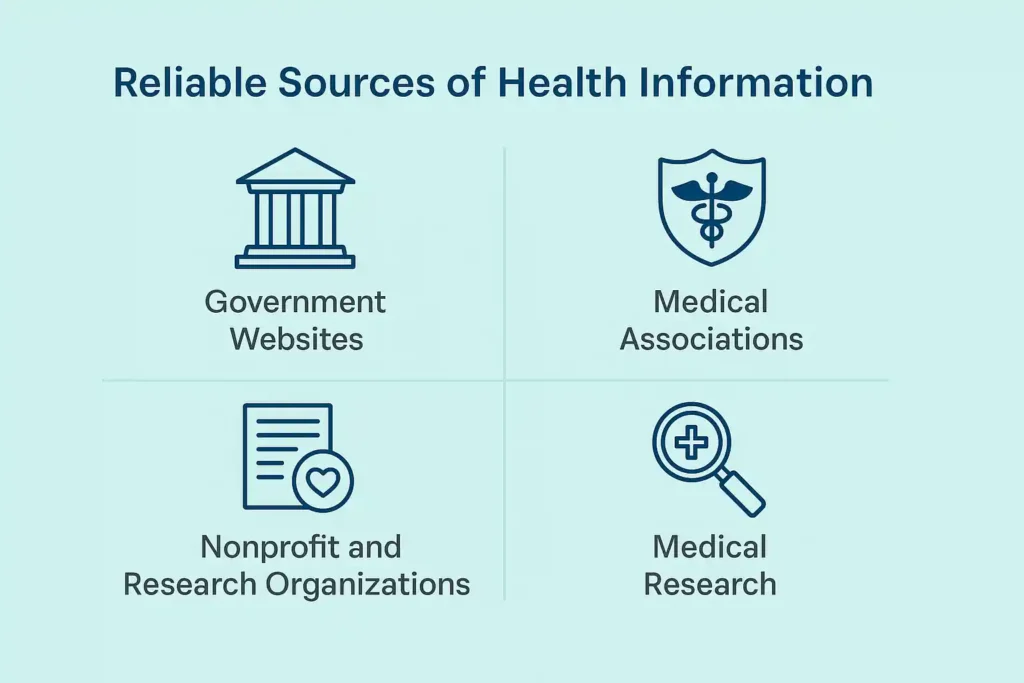Reliable medical websites are the safest way to get health advice you can trust. But with thousands of sites claiming to be experts, it’s easy to stumble upon misleading or harmful content. Misinformation can make you take the wrong medicine, delay treatment, or even ignore serious symptoms. That’s why finding reliable health information is a skill you need to protect your health.
This guide will show you how to spot health websites that are reliable, which warning signs to look out for, and how to check if the advice you’re reading is backed by real science.
What Are the Most Reliable Sources of Health Information?

When you need reliable health information websites, you shouldn’t trust random blogs or ads. Instead, go to sources of health information reliable enough for doctors and researchers to recommend.
Government Websites
Government health sites are some of the most reliable healthcare websites. They are usually funded by public health organizations and follow strict review processes. Examples include:
- Centers for Disease Control and Prevention (CDC)
- National Institutes of Health (NIH)
- World Health Organization (WHO)
These are reliable sources for medical information because their content is reviewed by doctors and public health experts before it’s published. They don’t promote products, which helps keep the information unbiased.
Medical Associations
Many professional medical groups run reliable medical information websites that share advice based on the latest research.
Examples are:
Medical associations update their pages often, so you’re getting the most accurate online health information possible.
Nonprofit and Research Organizations
Nonprofits and research institutions can also be reliable health sites if they have no hidden agenda. Look for sites that share scientific evidence and list their sources. Places like the Mayo Clinic and Cleveland Clinic are well-known for producing authentic health content that patients can trust.
Medical Research
For the most direct reliable medical information, check reliable medical research websites like PubMed or respected medical journals. These are where doctors and scientists publish studies. But be careful; research papers can be complex, so look for summaries from trustworthy medical websites that explain the findings in simple terms.
Is Dr. Good Deed a Reliable Site?
Yes. Dr. Good Deed follows a strict process to make sure readers get reliable health information websites they can trust.
We Have a Well-Trained In-House Editorial Team
Our editorial team includes experienced medical writers and editors who understand the importance of fact-checking health claims. Every article is reviewed before it’s published.
We Have a Gold Standard Medical Integrity Team
We work with licensed healthcare professionals who confirm the accuracy of our content. This ensures we only share credible health advice supported by reliable healthcare data.
We Put Accuracy and Trust at the Heart of All We Do
Our goal is to be a reliable website for medical information that helps people make safe health choices. We are committed to sources of health information reliable enough for doctors to recommend.
Evaluating Creator Content and Firsthand Experiences

While reliable medical sites are the safest source, you may come across personal blogs or videos where people share their own health stories. These can feel real and honest, but you need to be careful.
Firsthand Experience
Personal stories can be motivating, but they are not the same as reliable medical information. One person’s treatment might not work for you because your body, health condition, or environment may be different.
Before acting on personal advice, compare it with reliable healthcare websites and ask a licensed medical professional. This is part of fact-checking health claims so you don’t risk your safety.
The Bottom Line
The internet is full of both reliable health sources and dangerous misinformation. Learning how to tell the difference can protect you from health misinformation and online scams.
Always check:
- Who created the content
- Whether it’s based on scientific evidence
- If it’s reviewed by medical experts
- When it was last updated
If the site is a reliable medical site like a government agency, medical association, or respected research institution, you’re far more likely to get safe and authentic health content.
FAQs
How can I tell if a health website is trustworthy?
Look for trustworthy medical websites that list their authors, show their credentials, cite scientific evidence, and update content regularly. Stick to reliable medical research websites or official health agencies.
What are signs of unreliable health information online?
No author listed, no sources cited, overly dramatic claims, and promises of miracle cures are red flags for health misinformation.
Should I trust health advice from social media or influencers?
Not without checking it against reliable sites for medical information. Social media is full of opinions that may not be backed by reliable healthcare data.
Why is checking the publication date of health content important?
Medical knowledge changes fast. Outdated advice can be dangerous. Always make sure the site is a reliable healthcare website with recent updates.
How can I protect myself from online health scams?
Don’t share personal details with sites you don’t know. Avoid products that sound too good to be true. Stick to reliable medical information websites that are known for credible health advice.
Why is source transparency important in health information?
If a site doesn’t show where its facts come from, you can’t be sure it’s giving accurate online health information. Transparency is key to evaluating medical websites and spotting authentic health content.
















Leave a Comment